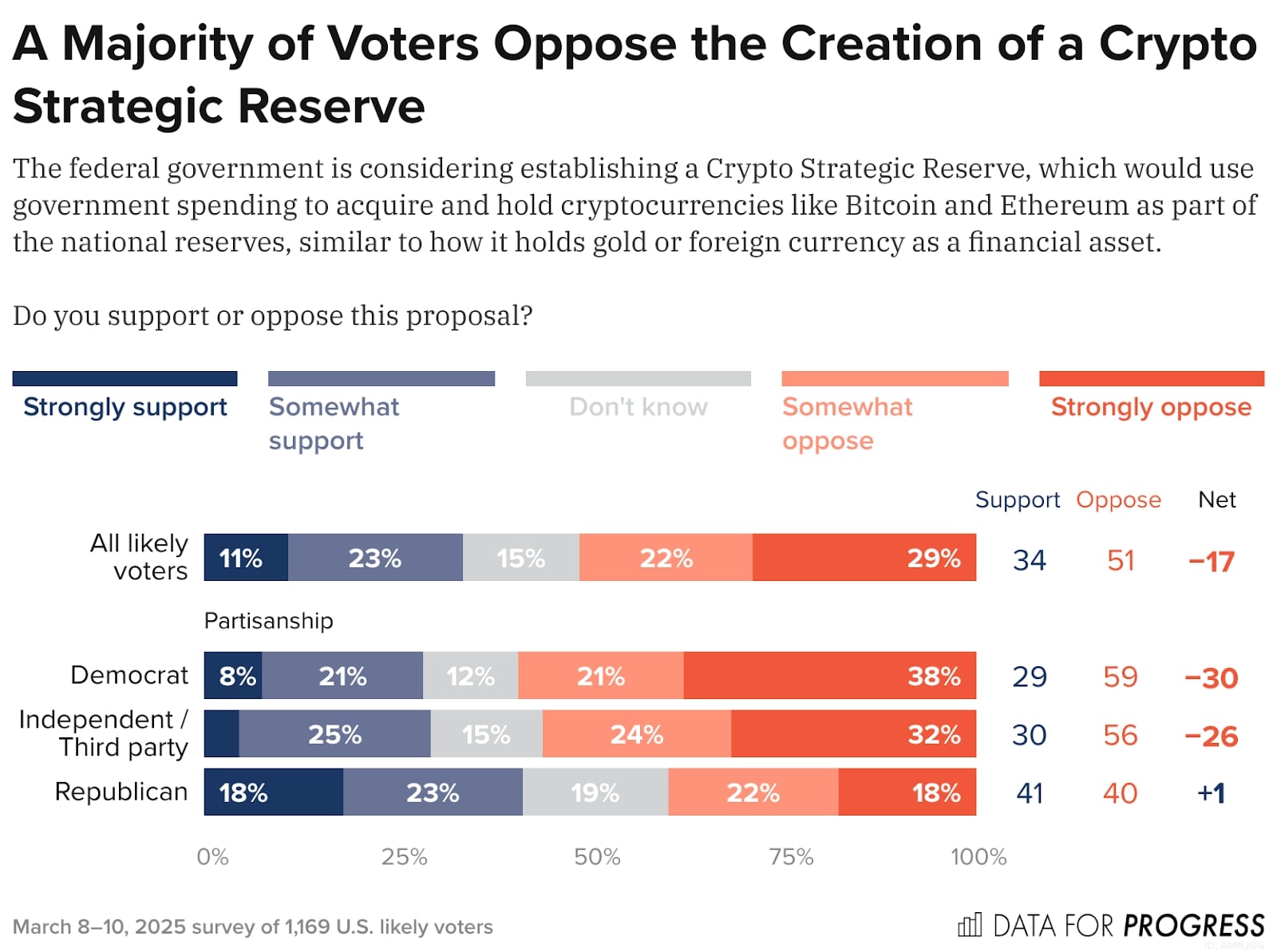Key Takeaways:
- Most U.S. voters don’t help the creation of a government-backed crypto strategic reserve.
- Cryptocurrency and blockchain improvement are the lowest-rated potential federal funding priorities, with simply 10% of voters supporting elevated funding within the sector.
- Republicans are extra probably than Democrats to help crypto initiatives, however general enthusiasm stays restricted.
A survey of 1,169 probably U.S. voters leaves little doubt that a big majority stays skeptical about authorities involvement in cryptocurrency, notably concerning the institution of a “Crypto Strategic Reserve”. The truth is, voters persistently prioritize conventional social applications and infrastructure investments over elevated federal funding for cryptocurrencies.
Public Resistance to the Crypto Strategic Reserve
Nonetheless, important resistance from the individuals has met President Trump’s govt order, which advised establishing a Crypto Strategic Reserve that will have concerned the federal government’s buying and proudly owning cryptocurrencies, reminiscent of Bitcoin and Ethereum. Greater than half (51%) of survey respondents opposed the plan. The opposition is pushed by Democrats (59%) and Independents (56%); Republicans are narrowly in favor, highlighting the stark partisan divide on the problem.


Analyzing the information, 29% of all voters mentioned they didn’t help the plan, whereas 11% strongly supported it. Which means help is extra fragile than opposition.
The backlash is widespread, making it tough for the Trump administration to achieve public help for such a reserve.
An Afterthought: Federal Funding for Crypto
Maybe essentially the most telling results of the Knowledge For Progress survey is that cryptocurrency and blockchain improvement ranked useless final amongst 9 federal funding priorities. Solely 10% of voters thought this sector ought to get extra federal {dollars}. Against this, voters supported elevated spending for:
- Social Safety (65%)
- Medicare (64%)
- Roads, Bridges and Transportation (63%)
- Medicaid (53%)
- Public Training (52%)
- Renewable Vitality (45%)
- Area exploration had 24% and Synthetic Intelligence had 20% respectively.
These findings illustrate that voters place a better precedence on social companies and infrastructure in comparison with cryptocurrency investments.
Republican voters, who’re usually extra receptive to market-based options, had been largely against authorities funding for cryptocurrency. Based on the survey knowledge, 36% of Republican respondents thought authorities funding for cryptocurrency and blockchain improvement must be diminished, in comparison with simply 12% on the lookout for a rise. 31% believed funding ranges ought to keep the identical.
A Glimmer of Hope for Crypto? Generational Variations
Although help for presidency funding of cryptocurrency was small general, the survey discovered a considerable generational hole. Help for elevated federal funding for cryptocurrency improvement was almost thrice as excessive amongst voters below 45 (18%) because it was amongst these over 45 (6%).
This means that youthful generations, who’re extra accustomed to digital applied sciences and cryptocurrencies, present higher openness to authorities help for the sector. Nonetheless, help stays comparatively low even amongst youthful voters, that means broader public acceptance would require effort and time.
Key Numbers of Help and Opposition
- 51% of respondents say they oppose the Crypto Strategic Reserve
- 34% of respondents help the Crypto Strategic Reserve
- 10% of voters consider the U.S. ought to enhance federal funding for cryptocurrency
- 65% of voters agree the U.S. ought to increase federal funding for Social Safety
- 29% of the voters consider funding for cryptocurrency ought to stay unchanged.
This new Knowledge for Progress survey reveals that the general public stays typically skeptical about authorities involvement within the cryptocurrency sector. Voters choose to spend cash for extra conventional social applications and infrastructure investments, and they’re reluctant to spend federal cash on a market they see as risky and speculative.
Extra Information: Memecoin Holders Surpass Bitcoin: What Does This Imply for Crypto?















